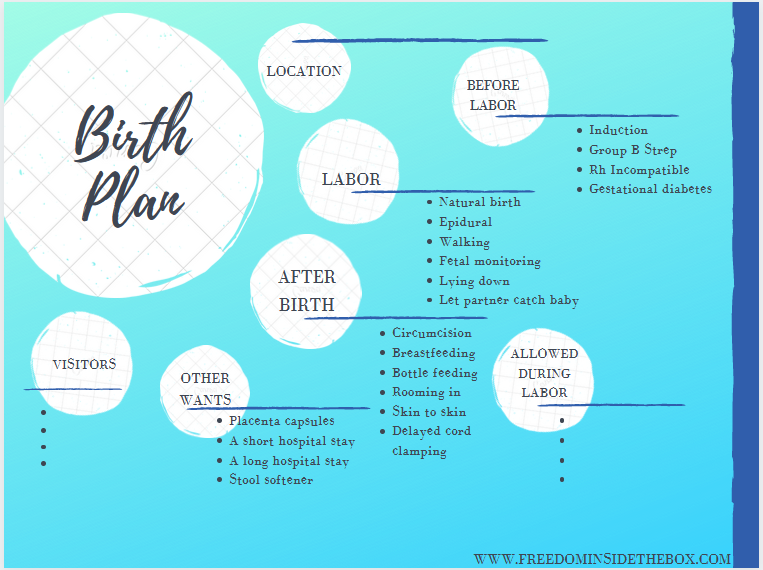Updated January, 2021
As you prepare for the arrival of your little one, someone, somewhere along the way will likely ask you about or suggest you make a birth plan. A birth plan is exactly what it sounds like: a plan for all the little details to help you have the birth you want. For some, this plan is a loose concept you have in your head or that you share with your providers. For others, it’s a full document detailing every preference.

A birth plan really offers you the opportunity to explore your beliefs about birth. Is it a natural process? Is it scary for you? What should be done with your baby after they are born? Asking yourself these types of questions can help you feel prepared for the upcoming birth. It’s also important to discuss these things with your partner so that you aren’t making decisions when emotions are running high. Establishing your preferences for epidural or other routine procedures, as well as discussing circumcision, breast feeding, and cord clamping can help your partner and your medical team better support you.
There can be so much information in a birth plan that I actually advise making two. One for you and your partner and your provider to do together, called the discussion birth plan. The other will be a short, bulleted, no more than one page document to give to hospital staff when you arrive to give birth. Taking the time to write both of these can help families increase confidence in their birthing process and result in more positive outcomes.

Before we dive into more detail regarding both plans, I want to cover what they are NOT. Birth plans are not a guarantee. You can do everything right, everything you need to, and in the end, you may not be able to have the birth you want. You may want a completely natural birth and end up having to go to the hospital for a c-section. You might want an epidural and find out you have arrived too late in your laboring process to receive one. While planning ahead, stating preferences, and asking questions is great, in the end it is very important that you be flexible. Of course, if your doctor is suggesting something you really do not agree with, asking questions such as “Is that really necessary” and “Are there any alternatives” is a great way to push back gently. In the end though, you may have to let go completely in order to keep you and your baby safe.
Now comes the planning phase. The first birth plan you want to create is the discussion birth plan. Think of this as an opportunity to educate yourself and determine what your beliefs around birth are. This plan may help you generate questions to ask you prenatal care provider. It’s also a great way to ensure your beliefs around pregnancy and birth align with your care providers. If you find that your belief systems differ significantly, it may be time to find a new provider.
There are a lot of questions your want to start asking yourself at this time. Where do you want to give birth? What interventions would you like and which ones do you want to avoid? Do you want to be able to move? What support measures do you want present (or not!). How do you want your labor to start? What kind of time do you need for processing if plans have to change? What will you do if your child has to be separated from you? What sorts of post natal care do you want, including skin to skin, feeding, sleeping, umbilical cord clamping, and circumcision. This is only a sampling of questions to ask yourself and your partner. You want to be sure you have a good feel for what your ideal birth will be like.
Your next plan is your hospital plan. This short plan should be no longer than one page and can be given to your hospital staff upon admission. This document should include bullet points, be straight to the point, and simple.
Limit it to the most important things in your book and nix any explanations you may be tempted to include. Covering information such as interventions, movement, support, laboring, and separation preferences can streamline the process and help you receive consistent care no matter who is on shift.

The birth plan isn’t a guarantee because, in the end, nothing about birth is a guarantee. It can still help you feel more confident though, and thus is a worthwhile endeavor. If you need help creating a birth plan, don’t hesitate to ask your care provider or even work with a birth doula. I have also heard that there are birth plans you can create online, but that many of them are out of date. As with all things in birth, never hesitate to ask for help. Your birth plan should make you feel empowered, confident, and clear.
Want to fill out a birth plan right now? Download and fill out this one and specify your desires by circling or crossing out the different options.












